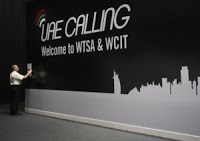Susanne Posel, Contributor
Activist Post
This week is the beginning of the UN World Conference on International Telecommunications(WCIT) at the World Trade Center at the United Arab Emirates in Dubai where the globalists will decide the fate of the free-flow of information on the Internet.
Back in May, Hamadoun Toure, Secretary-General of the UN International Telecommunications Union (ITU), stated that: “When an invention becomes used by billions across the world, it no longer remains the sole property of one nation, however powerful that nation might be.”
The UN’s ITU proclaims that because the Internet is a “global entity” that the UN should have jurisdiction over it, manage its abilities according to global UN standards and engage restrictions that could be installed at the fundamental level of the Internet to prevent any infractions of international mandates. The UN wants to include the domain-name system along with the Internet Corporation for Assigned Names and Numbers (ICANN), which is currently a privately owned US non-profit organization.
It is expected that the ITU would begin a sort of taxation that international telecommunications corporations would be expected to pay for the ITU’s handling of web traffic as it flows across the world.
ITU members would be privy to the new found cash flow that would be in the hands of international governance; which could begin to line the pockets of the UN in record time.
UN Secretary-General Ban Ki-moon, avid supporter of the WCIT, told the conference that “the overall objective is to ensure universal access to the benefits of information and communication technology—including for the two-thirds of the world’s population currently not on-line. The management of information and communication technology should be transparent, democratic and inclusive of all stakeholders.”
For nearly 2 weeks, the attendees of the conference will discuss the telecommunications networks that facilitate the borderless reach of the Web. The 123 member delegation, as well as digital giants such as Microsoft, satellite companies, cellular providers and Google, will come together as global governance is the key point and forcing nations and corporations to adhere to international mandates over the dissemination of digital information is expected to be finalized.
Roaming fees for the Internet, satellite use, fixed-line communications are on the table as the UN conference is also expected to tackle the issue of cyber-crimes, cyber-attacks, hackers, and empowering nations with the backing of the international community with regard to digital infrastructure.
In October, the UN offered to assist sovereign countries in Internet surveillance for anti-terrorism purposes. In a recently published report entitled “The Use of the Internet for Terrorist Purposes” (UITP), the UN claims that social media sites are used for terroristic schemes in terms of organization and recruitment; specifically Skype, Facebook, YouTube and Twitter.
Omission by the UN Office on Drugs and Crime (UNODC) explains that “terrorists use advanced communications technology” like the Internet to remain anonymous while building a loyal audience.
 The UN UITP report explains that WiFi networks manipulated at “cybercafes could provide an important data source for criminal investigations… There is some doubt about the utility of targeting such measures at Internet cafes only when other forms of public Internet access (e.g. airports, libraries and public Wi-Fi hotspots) offer criminals (including terrorists) the same access opportunities and are unregulated.”
The UN UITP report explains that WiFi networks manipulated at “cybercafes could provide an important data source for criminal investigations… There is some doubt about the utility of targeting such measures at Internet cafes only when other forms of public Internet access (e.g. airports, libraries and public Wi-Fi hotspots) offer criminals (including terrorists) the same access opportunities and are unregulated.”
Another point of weakness is the use of violence in role-playing video games where acts of terrorism are glorified. The UN cites that this conditioning to accept the role of a “virtual terrorist” downplays the seriousness of the matter. The collaboration of the United Nations Counter-Terrorism Implementation Task Force, which counts the World Bank, Interpol, the World Health Organization, and the International Monetary Fund demonstrations a decisive path of the globalist-controlled international community.
Vint Cerf, vice president at Google, asserts that the WCIT will most likely “give rise to new censorship and access controls in various regions.” Cerf said:
Starting in 1973, when my colleagues and I proposed the technology behind the Internet, we advocated for an open standard to connect computer networks together. But starting in a few hours, a closed-door meeting of the world’s governments is taking place in Dubai, and regulation of the Internet is on the agenda.
Opposition to the WCTI has devised their own treaties such as the Protection Global Internet Freedom online petition that has attracted thousands of supporters across the globe. Google’s contribution to international controls over the Internet is called Free and Open.
Terry Kramer, US ambassador to the UN explains that all Internet-related talks must focus on regulations services such as digital phone networks. Kramer said: “What we don’t want to do is bring in all the private networks, the Internet networks, the government networks, etc. . . That opens the door to censorship.”
Toure asserts that accusations that the meeting could limit Web freedoms are “completely untrue” and predicted only “light-touch” regulations.
At the inaugural day of talks, the International Telecommunication Regulations, a “binding global treaty facilitating global interconnection and interoperability of information and communication services” was renegotiated under the guise of maintaining “the free flow of information around the world and promoting affordable and equitable access for all.”
Susanne Posel is the Chief Editor of Occupy Corporatism. Our alternative news site is dedicated to reporting the news as it actually happens; not as it is spun by the corporately funded mainstream media. You can find us on our Facebook page.
linkwithin_text=’Related Articles:’



Be the first to comment on "UN Telecommunications Conference Assembles to Implement Governance Over Internet"